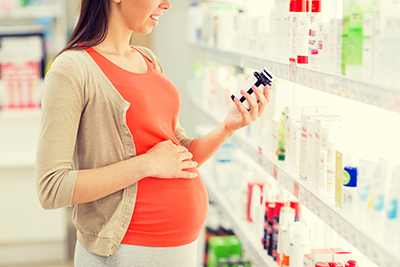You’re pregnant! What an exciting (and quite possibly very confusing) time!
Whether it was planned or an unexpected surprise, one of your biggest priorities now is to create the healthiest and most nourishing environment for you and your growing child.
With so much information out there, coming at you from so many sources, this could be a tall order. It’s hard to know what to do, particularly where food and supplements are concerned.
In this article we want to help answer many of your questions so that you can make informed, evidence-based decisions regarding nutritional supplements during pregnancy: why to supplement, what to take, and how much.
Food First, Then Supplements
Your first nutritional priority while pregnant is, of course, to choose the highest quality and nutrient-dense foods that you can access — and that you can stomach (yes, thanks usually to morning sickness, some foods are just hard to eat at certain times during pregnancy).
Despite best intentions to consume whole, nutrient-dense foods, it has been well-documented that some nutritional supplements are necessary during pregnancy.
That’s because dietary intake of certain nutrients is usually inadequate at best, or nonexistent altogether. In addition to those supplements, there are others that can also be beneficial, though not absolutely necessary. While there are supplements that are generally recommended for most pregnant women, always consult with your doctor before you start taking a supplement to make sure it is the right choice for your health and pregnancy.
If you’ve been taking other supplements regularly prior to becoming pregnant, read all labels carefully and check with your doctor before continuing. During this time, it is strongly advised to refrain from taking any supplements that promote fat loss or water loss, or that state specifically on the label “do not take while pregnant or nursing.”
Even some “natural” supplements made from plants and herbs can have potent effects in the body, and may not be recommended during pregnancy. Again, your physician will be able to help guide your supplementation choices during this time with your health and the health of your unborn child in mind.
Essential Supplements During Pregnancy
Prenatal Vitamins and Minerals
 If you’ve been planning to have a baby and have been trying to conceive, your doctor or nurse likely recommended that you start taking prenatal vitamins and minerals the sooner the better, in order to provide your body with the nutrients necessary for a successful conception and to ensure that you are getting adequate amounts of nutrients that prevent the kinds of birth defects that may occur early in pregnancy, before you know you are even pregnant.
If you’ve been planning to have a baby and have been trying to conceive, your doctor or nurse likely recommended that you start taking prenatal vitamins and minerals the sooner the better, in order to provide your body with the nutrients necessary for a successful conception and to ensure that you are getting adequate amounts of nutrients that prevent the kinds of birth defects that may occur early in pregnancy, before you know you are even pregnant.
The nutrients commonly found in prenatal supplements are not just beneficial for conception, they are also designed to keep both you and the baby as healthy as possible during your pregnancy. These supplements help prevent deficiencies in key nutrients. A recent paper by the International Journal of Obstetrics and Gynecology, states that childbearing women are commonly deficient in iron, iodine, vitamin B12, calcium, folate, and vitamin D, all nutrients that are needed for successful conception and growth of a fetus.1
Look for prenatal vitamin and mineral supplements that contain the nutrients listed below in the described amounts. Once you find the right one for you, it’s suggested that you start taking it as soon as you start trying to conceive — or the minute you find out you are pregnant, if your pregnancy was unexpected.
400 mcg (micrograms) of folate (or folic acid as we will discuss below)
400 IU (international unit) of vitamin D (for immunity and bone health)
300 mg (milligrams) of calcium (for bone health)
85 mg of vitamin C (assists in iron absorption and synthesis of hormone and DNA))
1.4 mg of thiamine
2 mg of riboflavin (B2)
20 mg of niacin (B3)
2.6 mcg of vitamin B12
(the above B-vitamins are co-factors in energy-producing pathways)
10 mg of vitamin E (a powerful antioxidant)
11 mg of zinc (for growth and sexual maturation)
27 mg of iron (component of hemoglobin in red blood cells)
150 mcg of iodine (synthesis of thyroid hormones)
Always take a multivitamin and mineral with food to reduce the likelihood of experiencing nausea from taking zinc on an empty stomach (who wants more nausea at this point?!)
Folate (Folic Acid)
Folate is the term used to describe both natural (folate) and synthetic (folic acid) versions of this water-soluble vitamin. Folate is necessary for rapid cell division and the prevention of neural tube birth defects (such as spina bifida). It also helps in the complete development of red blood cells and supports nervous system function. Additionally it is required for DNA synthesis.
 Food sources of folate include fortified cereals, enriched breads and grains, spinach, green lettuce, legumes, and liver (yum!)
Food sources of folate include fortified cereals, enriched breads and grains, spinach, green lettuce, legumes, and liver (yum!)
However, consuming folate-rich foods often isn’t enough to provide the amount needed, both before conception and during pregnancy, according to recommendations from the International Federation of Gynecology and Obstetrics (FIGO).1
As mentioned above, you can get folate from your prenatal vitamin supplement. Check the label to ensure that it contains a sufficient amount. It is critical that your supplement routine includes at least a dose of 400 micrograms (expressed as μg or mcg on the label) of folate per day. If your prenatal vitamin does not contain enough folate, consider taking a folate capsule along with your multi.
Recent research has suggested that the natural form is recommended over the synthetic form because too much synthetic folic acid can increase the risk of some types of cancers, and may not even be as effective in preventing neural tube defects.2 So, when looking for this vitamin, try to choose folate instead of folic acid.
Take folate with your prenatal multivitamin, and with food instead of on an empty stomach.
Choline
This B vitamin is a key factor not only for your cognitive health, but also your baby’s brain development. It can also aid in preventing neural tube defects, above and beyond folate. For instance, in one Epidemiology study of 180,000 pregnant women who were currently taking adequate amounts of folate, choline was still shown to significantly reduce the risk of the spina bifida.3
 Pregnant women should consume 450 mg of total choline per day, factoring in both foods and supplements, including your prenatal vitamin if it contains choline. Some good dietary sources of choline include:
Pregnant women should consume 450 mg of total choline per day, factoring in both foods and supplements, including your prenatal vitamin if it contains choline. Some good dietary sources of choline include:
- whole eggs: 145 mg/egg
- shrimp: 154 mg/4 ounces
- scallops: 125 mg/4 ounces
- chicken: 97 mg/4 ounces
- turkey: 95 mg/4 ounces
- tuna: 88 mg/4 ounces
- salmon: 82 mg/4 ounces
- collard greens: 73 mg/cup
- brussels sprouts: 63 mg/cup
- broccoli: 63 mg/cup
- swiss chard: 60 mg/cup
During pregnancy, some women may have an aversion to eggs (one of the best sources of choline), so a choline supplement with at least 200 mg of choline is recommended as a complement to whole-food sources of this water-soluble vitamin.
It’s best to take your choline supplement with food to avoid nausea or stomach discomfort.
Omega-3 Fatty Acids
 Omega-3 fatty acids are considered essential because your body does not make them. They are very beneficial for pregnant and nursing mothers, as they contribute to the development of a fetal brain and neural system, visual system, and motor function, and may play a role in gestation time and birth weights, according to research from Brigham and Women’s Hospital.4 Check out this in-depth article I wrote for Girls Gone Strong about Omega-3s to learn more about sources, benefits and potential concerns, beyond pregnancy.
Omega-3 fatty acids are considered essential because your body does not make them. They are very beneficial for pregnant and nursing mothers, as they contribute to the development of a fetal brain and neural system, visual system, and motor function, and may play a role in gestation time and birth weights, according to research from Brigham and Women’s Hospital.4 Check out this in-depth article I wrote for Girls Gone Strong about Omega-3s to learn more about sources, benefits and potential concerns, beyond pregnancy.
The highest sources of the two most essential Omega-3 fatty acids (EPA and DHA) come from fatty fish, like salmon or fatty tuna. However, due to the recommended lower intake of these fish during pregnancy because of concerns about heavy metal toxicity (mercury) and other chemicals (like PCBs) in lake or ocean water, it is best to supplement with fish or krill oil containing at least 1000 mg (1 gram) of combined EPA and DHA per day. If you are intolerant to fish or krill oils due to allergies or reflux (some women get fish oil “burps”) you can choose an algae-based DHA supplement to get at least 500 mg of DHA.
You can also get the Omega-3 ALA from foods like flax oil and chia seeds, as the body partially converts it to EPA and DHA. Adding flax oil or seeds to smoothies or salads is a healthy way to get some of your daily Omega-3 fatty acids.
Because fish oils and all fats can be bound by minerals (calcium and magnesium) in the gut during digestion, which reduces their availability, avoid taking fish oils with dairy. Additionally, it is best to take them at a different time than your prenatal multivitamins. For example, if you take your prenatals in the morning, take your fish oils at lunch or dinner.
Vitamin D
 During pregnancy, adequate levels of vitamin D in your body (confirmed with a blood test) can greatly reduce the risk of preterm birth, infection, and gestational diabetes. Your doctor will confirm that vitamin D insufficiency is common, so supplementation or attention to high foods sources of vitamin D should be a priority.
During pregnancy, adequate levels of vitamin D in your body (confirmed with a blood test) can greatly reduce the risk of preterm birth, infection, and gestational diabetes. Your doctor will confirm that vitamin D insufficiency is common, so supplementation or attention to high foods sources of vitamin D should be a priority.
Food sources of vitamin D include canned salmon and mackerel, fortified milk and milk alternatives, and fortified cereals. You also make vitamin D in your body when you are exposed to the sun; but that is all dependent on time of the year during which you are pregnant, your skin color (darker skinned women do not produce as much vitamin D with sun exposure, and sunscreen cover reduces production).
The recommended dietary allowance for vitamin D is 600 IU per day, which can be achieved through a diet high in the aforementioned foods. However, one recent Medical University of South Carolina study found that 600 IU per day isn’t enough for all women, especially those of African descent, to achieve healthy blood levels of this vitamin.5 The study researchers further stated that vitamin D supplementation of up to 4,000 IU per day is effective and safe for women and their babies, but did not give guidelines for how long to supplement.
Vitamin D is a fat-soluble vitamin that is stored in the body and not excreted readily, therefore high dose can raise concerns. The upper limit for vitamin D is 4000 IU per day and when taken at high doses for long periods of time can cause toxicity and developmental disability in your newborn. Thus, a supplement supplying 2000 IU per day is generally considered safe and adequate.
Because it is a fat-soluble vitamin, it’s a good idea to take vitamin D with your fish oil for optimal absorption.
Additional Supplements That Can Assist in a Good Pregnancy
Probiotics
Your gut is full of bacteria and probiotics help maintain healthy levels of the good kind of bacteria in your body. These bacteria assists in better digestion, immune system function, and can even help improve your mood.6 In addition, the healthy bacteria in your gut help you absorb nutrients more effectively.
With respect to pregnancy specifically, research published in The Journal of Nutrition shows that your baby’s gut intestinal microbiota (GIT), which affects overall health and immune function, begins to develop in utero and continues during breastfeeding (although the greatest boost to the colonization occurs during vaginal birth).7
 The type of bacteria a probiotic supplement contains varies from one supplement to the other. Some contain beneficial yeast, like Saccharomyces boulardii, that can also be good for gut health. Common strains found in supplements are Lactobaccilus acidophilus, Lactobaccilus brevis, Lactobaccilus rhamnosus, Lactobaccilus casei, Bifidobacterium breve and Bifidobacterium longum. Different strains provide different benefits, and this is why you will see a combination of several probiotics in one pill.8 Saccharomyces boulardii and Lactobaccilus rhamnosus seem to be most effective for supporting your body’s internal biology.9,10 Rotating through different brands over time is recommended to expose your body to several different probiotic strains.
The type of bacteria a probiotic supplement contains varies from one supplement to the other. Some contain beneficial yeast, like Saccharomyces boulardii, that can also be good for gut health. Common strains found in supplements are Lactobaccilus acidophilus, Lactobaccilus brevis, Lactobaccilus rhamnosus, Lactobaccilus casei, Bifidobacterium breve and Bifidobacterium longum. Different strains provide different benefits, and this is why you will see a combination of several probiotics in one pill.8 Saccharomyces boulardii and Lactobaccilus rhamnosus seem to be most effective for supporting your body’s internal biology.9,10 Rotating through different brands over time is recommended to expose your body to several different probiotic strains.
Some experts recommend taking your probiotics on an empty stomach, while other recommend taking them with food. However, there doesn’t seem to be a difference in effectiveness between the two methods. Your preference and consistency are what matter most.
Supplemental Protein (Powder)
As a fit and strong mama, you might be used to taking some kind of protein powder before or after your workout, as it aids in protein synthesis (muscle growth) and protein repair (muscle damage repair). Perhaps you supplement with a protein powder because it can be easier and less expensive than chewing on chicken all day. Protein supplements during pregnancy can also be beneficial in helping your growing fetus build adequate proteins in his or her developing body.
 Because research has not yet provided a definitive conclusion on the effect of artificial sweeteners on infant development, and considering that protein powders often have very high amounts of sweeteners to appeal to your taste buds, try to choose one that has no artificial sweeteners and the purest quality ingredients. In general, the fewer ingredients listed on the label—and the more of those listed ingredients you can identify as whole ingredients—the better.
Because research has not yet provided a definitive conclusion on the effect of artificial sweeteners on infant development, and considering that protein powders often have very high amounts of sweeteners to appeal to your taste buds, try to choose one that has no artificial sweeteners and the purest quality ingredients. In general, the fewer ingredients listed on the label—and the more of those listed ingredients you can identify as whole ingredients—the better.
If you experience bloating or digestive discomfort when using protein powder, you may need to experiment with a few different types or brands to find one that best agrees with your digestive system. For instance, while thickeners such as xantham gum and guar gum can cause digestive discomfort in some women, whey (which comes from cow’s milk and is the most popular type of protein powder) can also trigger issues in women with lactose intolerance.
If you want to consume whey, choose an isolate or hydrolysate for the lowest likelihood of gastrointestinal issues. If you don’t want to consume whey, there are several other protein sources to choose from—casein, hemp, rice, and pea to name a few. While casein is also derived from cow’s milk, it contains less lactose, making it a good option for women with mild lactose intolerance. However, casein is a relatively common allergen, so pay close attention to any reactions or symptoms after consuming a casein-based protein powder. Plant-based proteins, meanwhile, are ideal for those following a vegan diet. Check labels for dosage instructions.
What about Soy Protein?
Soy is an established phytoestrogen, which means it has some weak estrogenic effects, and may alter hormone levels.11 It’s not exactly like “taking hormones” as some experts claim, but because soy is so prevalent in so many foods, it can be easy to consume large amounts (imagine: soy latte with breakfast, edamame as a snack, tofu at lunch, and a soy-based dressing on your salad at dinner). The more soy you consume, the more likely it is to alter hormone levels. Therefore, it’s wise to avoid eating in large quantities unless otherwise advised by someone on your primary care team.
When looking at protein powders, there are a number of vegan alternatives that do not include soy, like rice, hemp, and pea. Beyond protein powder, we also recommend limiting your overall intake of textured soy protein, soy lecithin, soy cheese, soy yogurt, and soy milk.
If you exercise while you are pregnant (we encourage you to do so!) it would be convenient and beneficial to consume a supplement protein powder one hour before or after your training session to help you recover from exercise more quickly and prevent excessive muscle damage and breakdown.
Easing Stomach Upset with Supplements
Some pregnant women have found that taking vitamins or supplements trigger nausea or vomiting. If this is happening to you, here are a few strategies you can try before opting out of the supplement altogether:
- Take it on a full stomach. Some supplements are better tolerated when taken with food. Taking supplements halfway through your meal can be a good way to “sandwich” your dosage with some food.
- If you typically experience nausea in the morning hours, another strategy is to take the supplement later in the day with lunch or dinner.
- Check with your doctor about the amount of zinc you’re currently taking, if any. Many prenatal vitamins include zinc, and while adequate levels of zinc are important during pregnancy, too much can cause intense nausea symptoms.
- Try breaking your supplement in half and taking each half at separate times throughout the day.
- Consider taking a nausea-fighting supplement like ginger root capsules.12 Taking 250 mg of ginger root four times per day can aid in reducing nausea.
If you’ve tried the above strategies and still find that your stomach cannot tolerate taking a particular vitamin or supplement, consult your physician for further guidance. He or she may suggest taking time off of and reintroducing it once your symptoms have subsided.
Supplements to Avoid During Pregnancy
While there are plenty of beneficial supplements that are perfectly safe to take while pregnant, there are some naturally-occurring herbs that can be harmful during pregnancy and should be avoided. These include blue cohosh, rosemary, some essential oils like pennyroyal and parsley seed, turmeric, vitamin A, herbs in general, and others.13 Read supplement labels closely, and if there are cautions for pregnant women, quit immediately and consult your physician.
Supplements can be a great addition to your overall pregnancy nutrition strategy. Always consider your own individual needs, and if you’re unsure, assess with your doctor or dietitian what you are interested in taking.
Note from GGS:
Our FREE post-pregnancy exercise report is great for brand-new mamas, although many of the exercises are also appropriate for women who are much farther along in their postpartum recovery but haven’t yet done specific exercises to heal their core and pelvic floor.

If you or anyone you know has had a baby, and hasn’t done a specific core and pelvic floor healing protocol, make sure you download our FREE report.
Click to grab our FREE Post-Pregnancy Exercise Report
References
- Hanson MA, Bardsley A, De-Regil LM, Moore SE, Oken E, Posten L, Ma RCW, McAuliffe FM, Maleta K, Purandare CH, Yajnik CS, Russian H, Morris J. The International Federation of Gynecology and Obstetrics (FIGO) Recommendations on Adolescent, Preconception,and Maternal Nutrition: “Think Nutrition First”. International Journal of Gynecology and Obstetrics 2015 131(S4): S213–S253.
http://www.ijgo.org/pb/assets/raw/Health%20Advance/journals/ijg/FIGO_Recommendations_on_Nutrition.pdf - Troen AM, Mitchell B, Sorensen B, Wener MH, Johnston A, Wood B, Selhub J, McTiernan A, Yasui Y, Oral E, Potter JD, Ulrich CM. Unmetabolized Folic Acid in Plasma Is Associated with Reduced Natural Killer Cell Cytotoxicity among Postmenopausal Women. J Nutr. 2006 Jan;136(1):189-94.
http://jn.nutrition.org/content/136/1/189.short - Shaw GM, Finnell RH, Blom HJ, Carmichael SL, Vollset SE, Yang W, Ueland PM. Choline and risk of neural tube defects in a folate-fortified population. Epidemiology. 2009 Sep;20(5):714-9.
http://journals.lww.com/epidem/Abstract/2009/09000/Choline_and_Risk_of_Neural_Tube_Defects_in_a.17.aspx - Greenberg JA, Bell SJ, Van Ausdal W. Omega-3 Fatty Acid Supplementation During Pregnancy. Rev Obstet Gynecol. 2008 Fall; 1(4): 162–169.
https://www.ncbi.nlm.nih.gov/pmc/articles/PMC2621042/ - Hollis BW, Johnson D, Hulsey TC, Ebeling M, Wagner CL. Vitamin D supplementation during pregnancy: double-blind, randomized clinical trial of safety and effectiveness. J Bone Miner Res. 2011 Oct;26(10):2341-57.
https://www.ncbi.nlm.nih.gov/pubmed/21706518 - Jenkins TA, Nguyen JC, Polglaze KE, Bertrand PP.Influence of Tryptophan and Serotonin on Mood and Cognition with a Possible Role of the Gut-Brain Axis. Nutrients. 2016 Jan 20;8(1). pii: E56.
https://www.ncbi.nlm.nih.gov/pubmed/26805875 - Thum C, Cookson AL, Otter DE, McNabb WC, Hodgkinson AJ, Dyer J, Roy NC. Can nutritional modulation of maternal intestinal microbiota influence the development of the infant gastrointestinal tract? J Nutr. 2012 Nov;142(11):1921-8.
http://jn.nutrition.org/content/142/11/1921.short - Chapman CM, Gibson GR, Rowland I. Health benefits of probiotics: are mixtures more effective than single strains? Eur J Nutr. 2011 Feb;50(1):1-17.
https://www.ncbi.nlm.nih.gov/pubmed/21229254 - Hayes SR, Vargas AJ. Probiotics for the Prevention of Pediatric Antibiotic-Associated Diarrhea. Explore (NY). 2016 Nov – Dec;12(6):463-466.
https://www.ncbi.nlm.nih.gov/pubmed/27688016 - Szajewska H, Konarska Z, Kołodziej M. Probiotic Bacterial and Fungal Strains: Claims with Evidence. Dig Dis. 2016;34(3):251-9.
https://www.ncbi.nlm.nih.gov/pubmed/27028756 - Andres S, Hansen U, Niemann B, Palavinskas R, Lampen A. Determination of the isoflavone composition and estrogenic activity of commercial dietary supplements based on soy or red clover. Food Funct. 2015 Jun;6(6):2017-25.
https://www.ncbi.nlm.nih.gov/pubmed/26023053 - Marx W, Kiss N, Isenring L. Is ginger beneficial for nausea and vomiting? An update of the literature. Curr Opin Support Palliat Care. 2015 Jun;9(2):189-95.
https://www.ncbi.nlm.nih.gov/pubmed/25872115 - Safety Information, Pregnancy Safety. National Association of Holistic Aromatherapy.
https://naha.org/?/explore-aromatherapy/safety/#pregnancy
The post Important Supplements For A Healthy Pregnancy appeared first on Girls Gone Strong.






